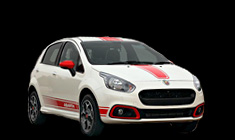News
Thar petrol v/s Thar diesel: Which to buy for better resale value later
Also, is the depreciation hit more pronounced in RWD vs 4x4?
BHPian Bit recently shared this with other enthusiasts.
Once the heart is set on a Thar Automatic, there is no backing out. However, the question here is the fuel type that has been baffling me. My monthly run would be around 500-700 KMs at maximum with the car being parked idle for even up to a month at times.
Now, the obvious suggestion for my running requirement would be the Petrol. I’m from MP where there is no apparent Diesel ban (at least as of yet) but fuel prices are on the higher side (Petrol at 110 RS, Diesel at 95). With the abysmal FE of 5-6 KMPL for Thar Petrol AT, I have the following questions:
- What would be the reselling price for a Thar Petrol AT? I plan to keep the car for 3-5 years and I’ve heard that that the used-car market doesn’t really appreciate Petrol AT Thars to the extent they don’t even find any takers! Is this true? This is my biggest concern. Also, is the depreciation hit more pronounced in RWD vs 4 x 4?
- How much is the difference in the maintenance/service cost of petrol vs diesel Thar, including DPF issues (if any)?
- And finally, @Aditya’s words from the Official review “The diesel is very smooth & peppy. In fact, after spending time with it, we were hard-pressed to think why anyone would buy the petrol over this (main market = Delhi-NCR & its 10-year limit on diesel cars). Not like the Thar Petrol is substantially cheaper to buy either. The diesel will give you higher FE than the petrol, a longer tank range (important for highways & offroading) and durability (going by Mahindra's long expertise with diesel).
Would I be a fool to take the Petrol Thar then?
All suggestions are appreciated to help a confused soul.
Here's what GTO had to say on the matter:
Buying a car purely for resale is the wrong attitude. It's like staying at the Taj and ordering a naan less to save money.
Buy a car to enjoy the ownership experience & drive quality.
My situation was similar. I chose the petrol for its performance, refinement & zero-DPF / BS6 hardware issues.
Poor. In the history of the Indian car scene, if there is a petrol-guzzling SUV and it has a fuel-efficient diesel sibling, the diesel has better resale while the petrol is a depreciation disaster.
I don't understand why you are hellbent on selling it in 3 - 5 years. Why not buy the right car and hold onto it for longer? In a BHPian poll, 75% voted for owning a car for 8 - 10 years - link.
If you still want to drive it for just 3 years, then buy a used Petrol Thar. You'll get it for a great price and then don't have to worry about depreciation.
Here's what BHPian Turbanator had to say on the matter:
Diesel will be my preference. It's pretty refined and whatever shortcomings are there, it mostly involves steering and the ride. Your running expenses will be lower, and so will it have better resales. Beyond NCR, I don't think of any negative reasons. Even here, I helped a friend book an X7 in Diesel recently, as his running is higher, and he hasn't kept the car for more than 4-5 Years.
Update:
Your use case - Petrol
Resales - Diesel
So, if you are concerned about resales at the time of buying, get a Diesel. As I mentioned, you won't miss Petrol if you get Diesel, it's a heavy Jeep and not a sports car.
Here's what BHPian Kosfactor had to say on the matter:
Petrol AT with Convertible top.
Black if you like black, Red if there is plenty of greenery around.
Drive around in the night with the top open, and enjoy a new way of motoring.
Here's what BHPian shankar.balan had to say on the matter:
My running is 700 - 800 kms per month on average. I find Petrol to be sensible for this kind of running. The Diesel requires regular highway runs at constant speeds because it requires one to keep the revs constant for reasonable periods, or else the DPF clogging issue keeps popping up.
Check out BHPian comments for more insights and information.
News
2022 Hyundai Tucson petrol vs diesel engine: Which to buy?
The turbo-diesel has more BHP, torque, better fuel efficiency and performance. The refinement is also top-class.
Hyundai launched the 4th-generation iteration of its premium Tucson SUV in the Indian market earlier this month. The new Hyundai Tucson features a completely new design, in line with the brand's latest 'Parametric Design' philosophy.

The 4th-generation Tucson is offered in two variants: Platinum and Signature, both of which are offered with a choice of petrol and diesel engine options. The Tucson is also available with an optional 4WD with the diesel engine.
So, if you were to buy the 4th-gen Hyundai Tucson, which engine option would you pick & why?
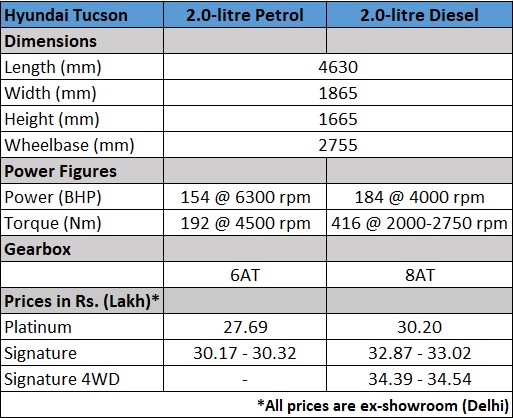
Starting off with the petrol unit, the new Tucson comes with a 2.0-litre 4-cylinder naturally-aspirated engine. It produces 154 BHP @ 6300 rpm and 192 Nm @ 4500 rpm and is paired with a 6-speed automatic transmission as standard.
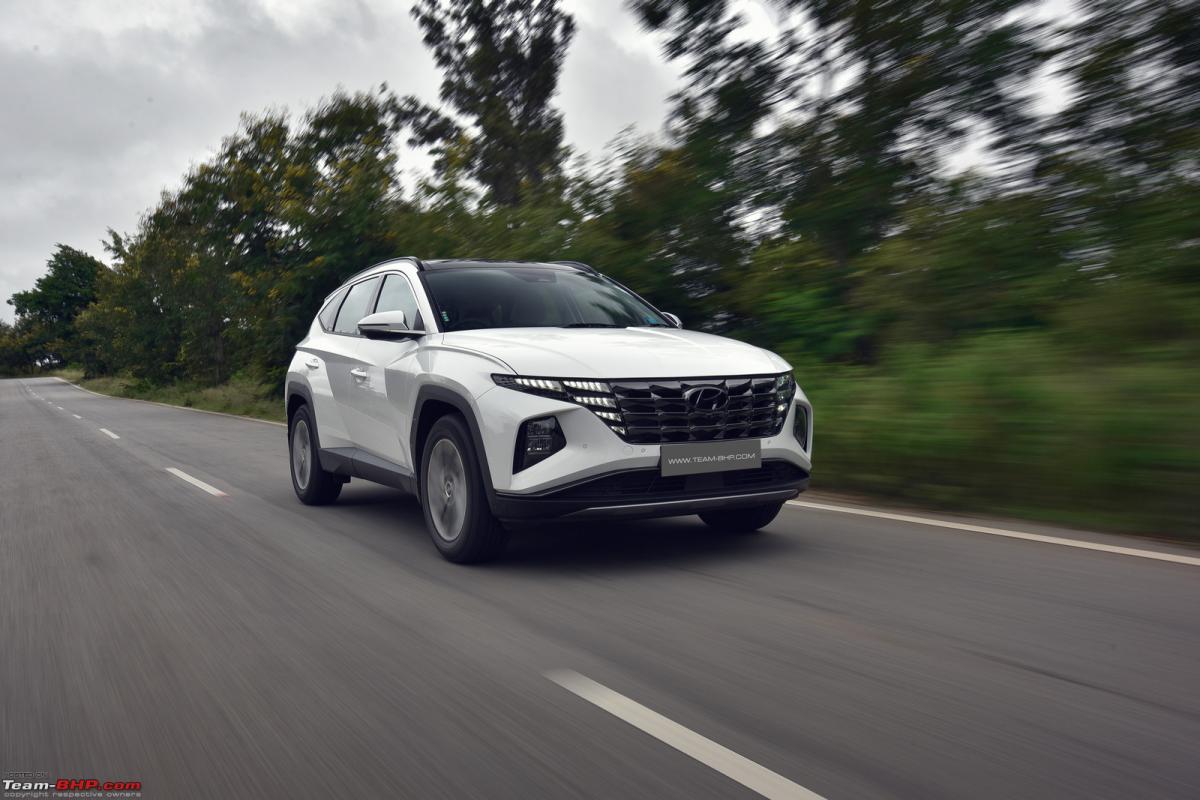
Coming to the diesel version, the 4th-gen Hyundai Tucson comes with a 2.0-litre turbocharged diesel unit producing 183 BHP @ 4000 rpm and 416 Nm @ 2000-2750 rpm. The engine is paired with an 8-speed automatic transmission as standard.
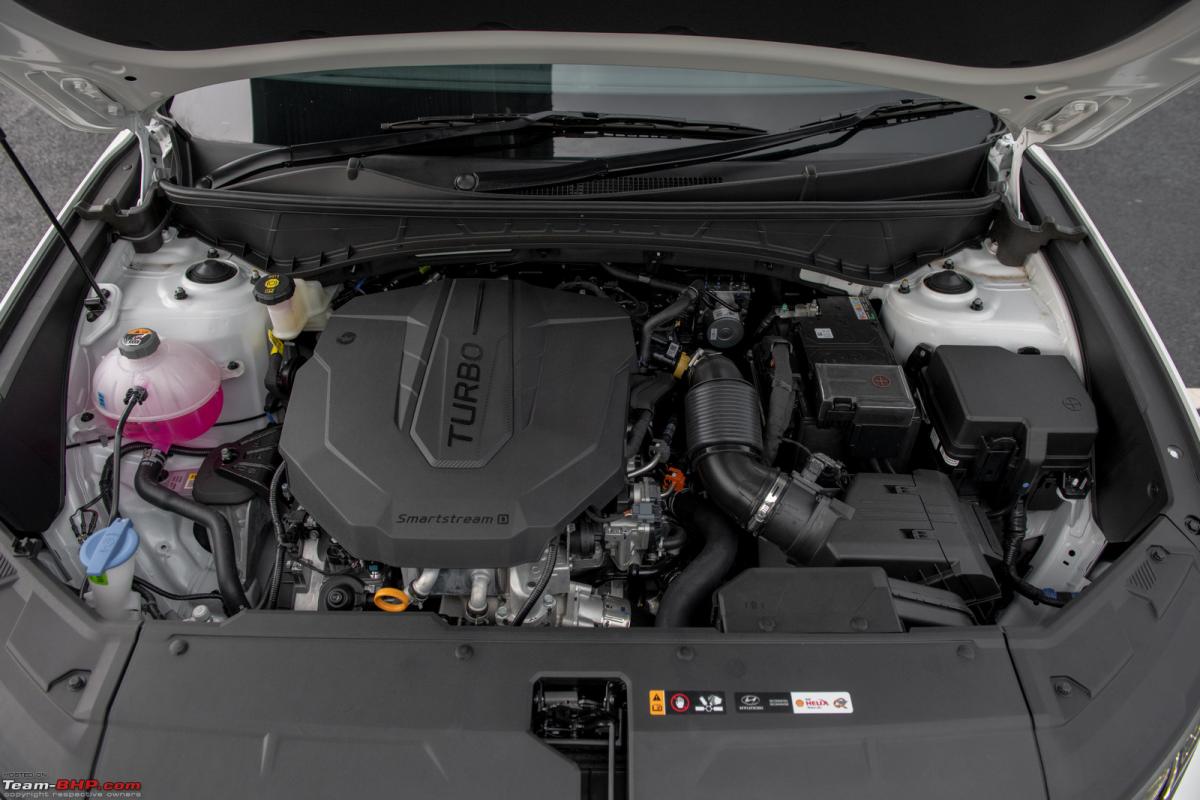
Slot the gear lever into D, lift your foot off the brake pedal, and the car gets off the line smoothly. Throttle response is good and power is delivered in a linear manner with a gentle foot on the accelerator. Since the Tucson has a very urban feel to it, we made sure that we spent enough time driving the car in the city traffic. And despite the Bangalore ring road traffic being excessively unpleasant, the Tucson wasn't.
Driving in D, the engine was calm and provided power smoothly. Going on and off the throttle was also a smooth affair, which means that your passengers also won't have to worry about a jerky drive. The gearbox goes up the ratios pretty quickly. You won't feel the upshifts as the transition is very smooth. Put your right foot down and you will experience some lag as the torque converter does take a second to respond. But after that, you get a strong surge of power that will help you make those quick overtakes and close those gaps in traffic. Overall, the tall seating position, good all-around visibility, light controls and smooth gearbox make the Tucson very easy to drive in the city.
On the open road, where you can stretch the car's legs, the Tucson is impressive. It accelerates quickly, and with the good insulation, you may not even realize the speeds you are doing. Put your foot down and the AT downshifts to get you going. Overtaking on the highways is a breeze, but it's better if you anticipate and prepare for the slight delay in downshifting. Even with foot hard down, the AT doesn't let the engine rev beyond the 4,500 rpm redline (in manual mode too). The engine feels quite relaxed cruising for long distances. In 8th gear, at 100 km/h, the engine spins at a comfortable 1,500 rpm, while at 120 km/h the tachometer reads 1,750 rpm.
Read the full official review here.
Here's what GTO had to say on the matter:
In this era of turbo-charging, I find most NA petrol to be boring. The Tucson's 2.0 Petrol is "nice", but that's it. Not to forget, it's the same motor you get in the cheaper Alcazar too.
The turbo-diesel has more BHP, torque, better fuel economy and performance. The refinement is also top-class. The diesel here is the no-brainer choice for me. Only reason to pick the petrol is if you live in Delhi-NCR & want to keep the car for 15 years, are a very sedate driver, don't want to stretch your budget by another 2.5 - 3.0 lakhs or have very low running.
Voted for the impressive 2.0 diesel.
Here's what BHPian anjan_c2007 had to say on the matter:
Going by precedents and by the recent illogical decisions emanating from the judicial forums and also from the corridors of power during these times, a petrol engine is always to be preferred by all who prefer to keep the SUV for at least 15 years. The lower on performance petrol engine with its reported 154 BHP @ 6300 rpm, 192 Nm @ 4500 rpm and its 6-speed automatic transmission will be the choice.
Diesel as fuel is under harsh criticism by all those who matter in the decision-making hierarchy but do not understand the A, B or C of ICE technology. Hence, in the near to distant future, diesel engines could face severe bottlenecks for their seamless sailing and their longevity is unpredictable.
But those who do not bother for the life of their machine and also prefer the more powerful and punch-packed 183 BHP @ 4000 rpm, 416 Nm @ 2000-2750 rpm engine with the 8-speed automatic transmission, could always prefer such a variant.
The petrol variants cost about Rs 3.5 L lesser than the diesel variants.
Here's what BHPian sunikkat had to say on the matter:
This is the easiest poll. More than being impressed with the Diesel engine, I am disappointed with the petrol. A 2-litre NA engine has no business in a car costing 40 lakhs. And then you compare the competition. Even cheaper Creta has a much better engine than Tucson petrol. So diesel all the way.
Here's what BHPian vijaykr had to say on the matter:
I had a chance to drive the previous gen, both Diesel and Petrol cars and test drove the 4th gen recently.
In my opinion, if the usage is mainly intended for city driving (80% or 90%), then the Petrol car seems to be adequate. I didn't find too much issue with it in some rush hour and some small stretches of free-flowing traffic.
The diesel was (is) another story altogether. It is far more eager to push forward with enough power on tap to keep moving briskly through traffic. And on the open road, it builds up speed really well and overtakes don't require much effort.
Even though there is a possibility of restrictions on diesel coming in future, personally I'd go for diesel only.
Voted for diesel.
Check out BHPian comments for more insights and information.
News
Toyota Innova 2.7L petrol AT owner drives 2.8L diesel AT: Quick comparo
The best fuel efficiency figure we got from the Innova diesel was 14.7 km/l.
BHPian adigup recently shared this with other enthusiasts.
To give some background, we own a Toyota Innova Crysta 2.7 Petrol Automatic (2019) at home, which is mostly driven by my dad for his everyday commute (he thinks it's the best car on this planet and he can leave anyone behind with the 2.7-litre engine). I am able to get my hands on it at least once or twice a week and I can say that am very much familiar with the car and have been able to take it on family road trips. I love driving the car and revving the 2.7-litre Dual-VVT-i motor (which I later regret seeing petrol prices at Rs 11x.xx).
I have driven a cousin's 2.4 G Manual, which definitely felt great because you can never go wrong with a diesel Innova. The car never fails to surprise. It feels very lively and reminds me of our old 2013 2.5 VX Innova.
One of my very close friends has a 2.8 ZX AT and while I always got the chance to drive it with him in the city, I never got the experience of the motor beyond 3,500 rpm and 75 km/h. Recently, our group of 4 friends planned a trip from Delhi to Landour and back, we decided to take the 2.8 ZX AT as the other two Innovas in our group are 2.7 ZX AT (mine) and 2.7 VX MT (another friend's), and seeing the petrol prices and some other factors we didn't even think of the 2.7s.
Out of 4, the two of us drove and I can clearly say that I got to fully experience the 2.8-litre diesel. The total trip was around 630 km and I drove 300 km which was in Delhi and on the Meerut highway (till Chhutmalpur) and then my friend took over from there. The best part was that since we have a ZX at home, I felt at home driving his car (or like there was no difficulty getting 'familiar' with it).
While I always loved the initial grunt and power of the 2.8 on the city, it just felt very bland and unenthusiastic compared to the 2.7 on the highways. The steering felt heavy most probably because of the heavier diesel engine and the engine noise was typical diesel, and I clearly prefer the throaty sound of the 2.7 over that. It definitely felt effortless pulling it from 0 to 60, after which I started missing the 2.7 very much.
In 2.8, I could not feel much of a difference driving the car in Power and Normal mode (Eco was quite significant). The revs are at around 2,000 rpm while the car is at 110 km/h, and it tends to get noisy inside the cabin.
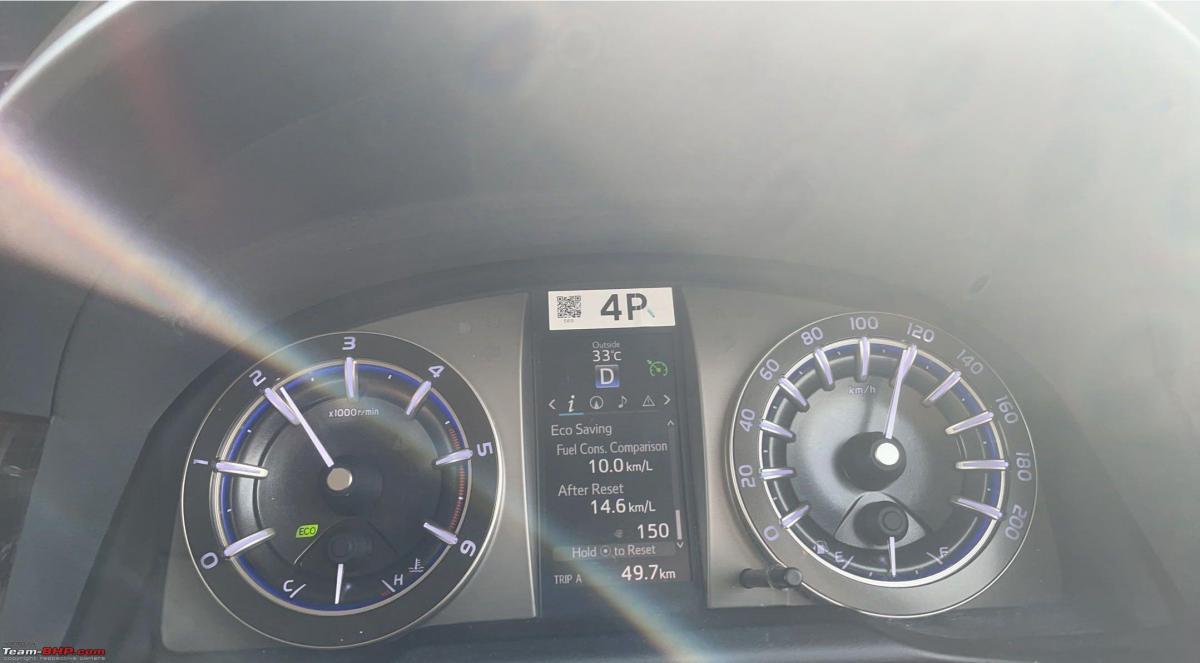
At the same time, in my 2.7, every mode feels different. The engine isn't as torquey but once you get going, the car picks up pace in no time. I am also 100% sure that past 70 km/h, it will be the diesel 2.8 in the petrol 2.7's ORVMs. When the car is at 120 km/h, the revs are at 2,000 rpm, and the engine noise is minimal at that point.
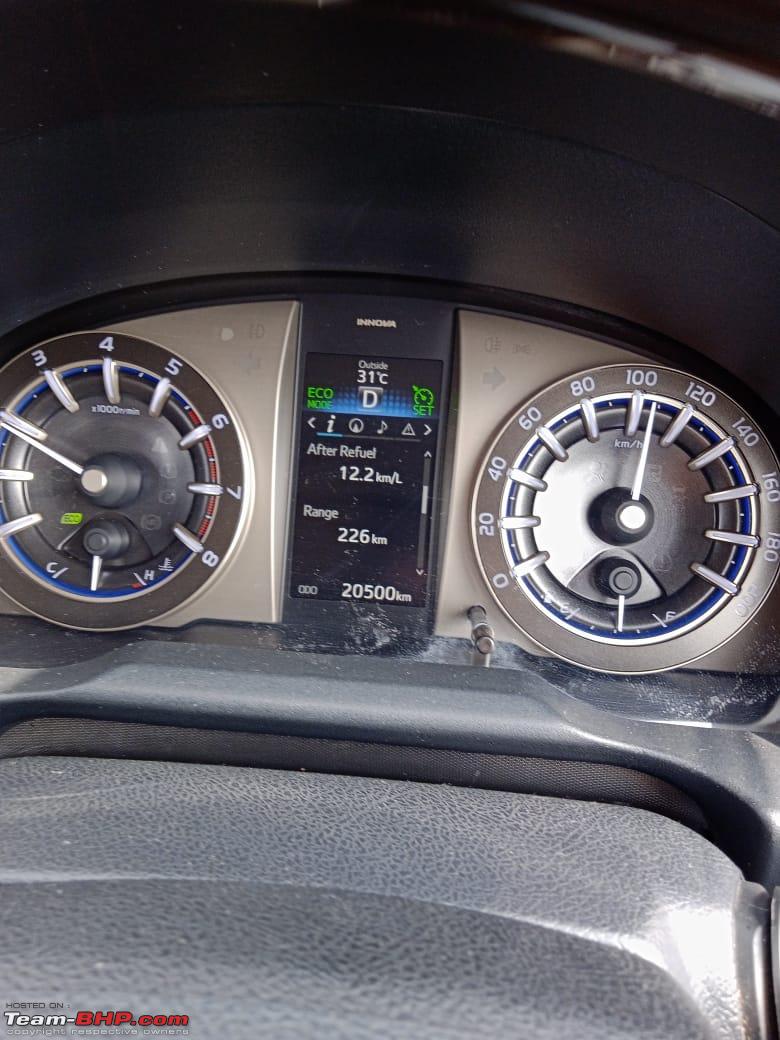
It is past 60/70 km/h where the petrol 2.7 gets to show off and really get going. The car isn't much of a drinker if driven sedately. One can manage anywhere between 8 to 12 km/l.
Overall, I feel 2.7 petrol is far more superior in its ways, and the only reason the 2.8 felt good was:
- Fuel efficiency
- Low-end grunt
- Good for city speeds and quick overtakes (overtakes are equally effortless in the 2.7 petrol)
Getting back to the trip, we managed to get a fuel efficiency of 12.1 km/l (and the highest of 14.7 km/l was seen) with 4 on-board and 4 medium-sized suitcases (the petrol would have returned a fuel efficiency of 10.5 km/l at the max). This also included driving on the hills of Mussoorie in traffic (around 120 km in all).
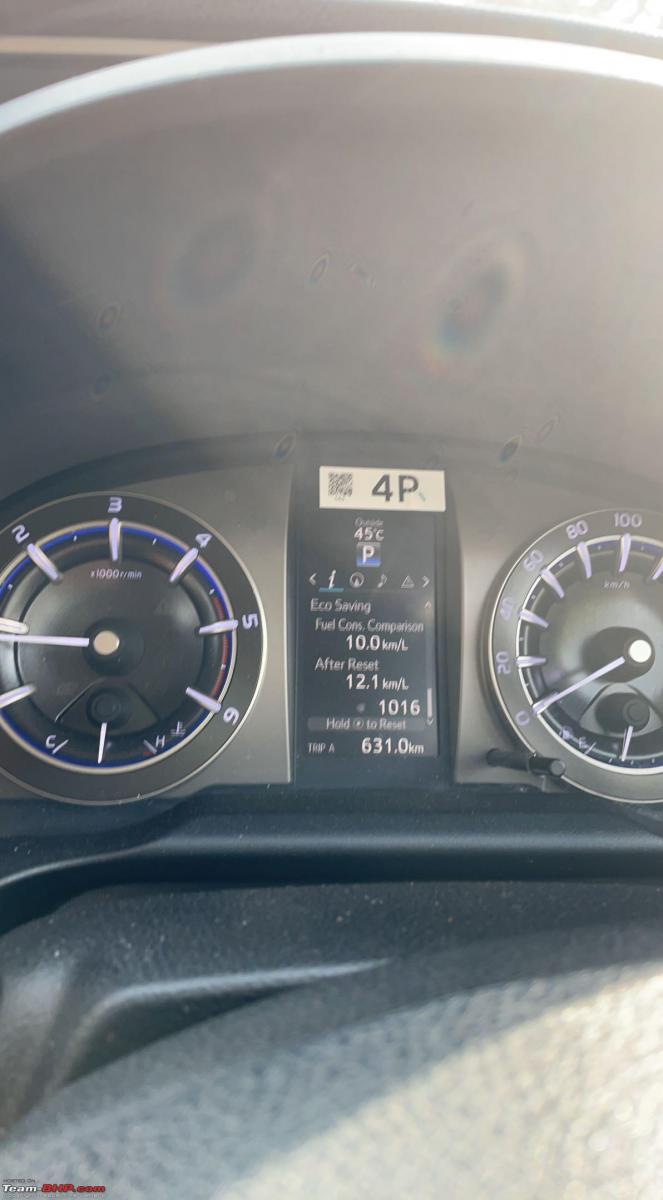
Lastly, I was a little surprised to realise that the diesel Innova gets a smaller fuel tank. I wish Toyota had given it the bigger 65-litre tank in the petrol.
Check out BHPian comments for more insights and information.
- Tags:
- Indian
- Innova
- petrol vs diesel
- MPV









